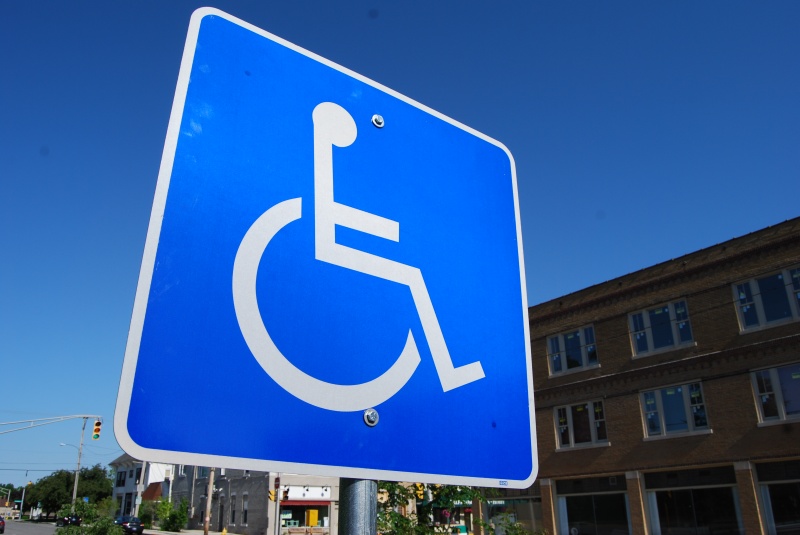 |
| Photo credit: Steve A Johnson on Flickr |
Though this was the third college I'd attended, it was the first time I registered the campus center. But I knew I would need it, if only to get permission to use my iPad in all of my classes, regardless of class policy, because taking notes by hand I'd already learned had become too painful, thanks to rheumatoid arthritis.
Even as I was registered as a disabled student on campus, though, I still hesitated to call myself disabled.
I knew, logically, I was and am, but when you have a chronic illness, some days it doesn't feel like you're disabled enough to really say you're disabled. On days when I'm not flaring, I appear, for all intents and purposes, able-bodied. Sure, I can't write by hand and it's ridiculously easy to make my hand hurt, and sure, I learned the hard way I can't jog if I value my ability to walk and I can't stand or walk for prolonged periods anymore, but most of the time I look fine. I can walk without mobility aids, and I get through the day with more pain than most, yes, but I've gotten good at hiding it and being in low amounts of pain throughout the day has become normal for me.
So I hesitated. I rationalized that I don't feel disabled most of the time—which, to be honest, is only half-true. More like I didn't feel disabled when I chose not to think about the things I couldn't do anymore: jog, participate in my favorite sport (taekwondo), help support myself through a part-time job I'm good at (waitressing), write by hand, etc. More like a part of me felt as though it was somehow disingenuous to say that I'm disabled because...I don't know? What's the bar for "disabled enough"?
(Ignoring, of course, the flare that put my whole left arm out of commission for a week because moving it at all was excruciating. Ignoring, the multiple flares that left me limping to class as my knee swelled up under my jeans, and that time I presented my final in so much pain I was gritting my teeth. Ignoring, of course, the bad days, because they were rare and not all the time.)
Which was illogical—I knew that, and I certainly didn't hold anyone else to that standard when they said they were disabled. And yet, I couldn't stop myself from hesitating when I said the words myself.
Then August happened, and I had the worst health month of my life: three flares in three weeks in a row. Three times when for multiple days I felt like I was running on half my energy levels or less. Three times when I fought full-body exhaustion on top of increased pain, for multiple days at a time.
Then, last week, my family and I went to the zoo. It was a fun trip, and for the first half of the day or so I was fine. A little tired from a quick flare the night before, but all in all I felt okay.
And then my knee started hurting. This surprised me, because I haven't had my knee bother me in probably almost a year. But it was familiar, and I didn't think too much about it. I asked my family if we could sit, and we did for five minutes or so, and then I felt fine and we kept going.
And then my knee hurt again, and my hips joined the chorus. Both of them. This was completely new—I'd had issues with my hips before, but only when I was sitting. But now I was definitely flaring and as I walked, the pain and stiffness got worse. Much worse.
I gritted my teeth and tried to ignore it for a while. I was determined to enjoy myself and tried to distract my brain by focusing on the animals. I told myself I was out doing something fun and everything was fine and I didn't want to cut our day short. Besides, I reasoned, we were almost done. I could get through the last bit.
It wasn't long after that I realized the pain was distracting me from what we were seeing. That I could no longer focus on having a good time because my body hurt too much. That every step was a battle and for the first time in my life I wished I had a wheelchair.
That was scary. And sobering. And when I finally broke down and admitted to my family I needed to sit down because I couldn't walk the rest of the way without a break, a thought hit me very clearly: I really am disabled.
Because my chronic illness is largely invisible, I've struggled with how to incorporate it into my identity. Like so many things, it can feel strange to say "this is part of who I am" when other people can't see it. Visibility absolutely makes a difference and changes how the world interacts with you, but plenty goes on beneath the surface that others can't see, and it's one of the many reasons why people are to be believed when they say, "This is who I am."
Twitter-sized bite:
Author @Ava_Jae shares a personal post on chronic illness, invisibility, and identity. (Click to tweet)
No comments:
Post a Comment